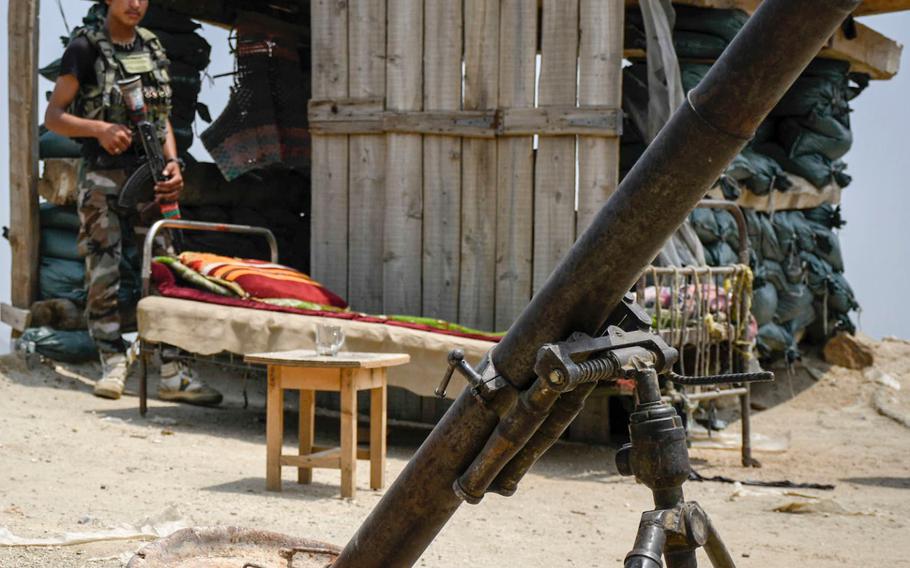
Afghan militia members stand guard at an outpost in Achin district in Nangarhar province in eastern Afghanistan. Since the U.S. withdrew from two bases in the province in May and July 2020, the Taliban have stepped up attacks, local officials say. (J.P. Lawrence/Stars and Stripes)
ACHIN DISTRICT, Afghanistan — In the weeks since U.S. troops pulled out of bases in eastern Afghanistan, frequent Taliban attacks have become the new normal for many in Nangarhar province, militia fighter Hekmatullah said as he scanned the valley below his remote outpost.
“Now, it’s Taliban. Before, it was Daesh,” said the 20-year-old, using an Arabic acronym for the Islamic State group that the extremists dislike. “Our lives are the same as before.”
Hekmatullah, 20, who like many Afghans uses one name only, was manning the same outpost where his father was killed in the fight against the ISIS affiliate in Afghanistan last year.
Most of the territory that was briefly controlled by the extremist group in the country was in Nangarhar province.
ISIS was ousted from Nangarhar last year after offensives by the Taliban, Afghan government troops and the U.S. military, which had troops at bases in Achin and Deh Bala districts.
American troops left Achin in May and Deh Bala last month, locals said.
Today, the scars of decades of war and recent battles against ISIS mar the landscape in Achin around the former U.S. Combat Outpost Blackfish, which once housed small Special Forces teams.
A gaping crater in the side of a mountain marks the spot where the U.S. dropped the GBU-43B Massive Ordnance Air Blast, or MOAB, that killed some 90 ISIS fighters in 2017.
The countryside is pockmarked with ISIS positions that were reduced to rubble by U.S. bombing campaigns.
Unexploded ordnance has turned a once-busy marketplace near Blackfish into a ghost town. Dozens of militants died in the market from U.S. airstrikes, locals said.
Taliban fighters have launched daily attacks in the district since the U.S. left, said Dost Mohammad, a militia commander who lost two of his men in the last month in battles with the insurgents.
“They are stronger, they are fighting more,” Mohammad said.
Taliban attacks are also on the rise in other provinces where the U.S. has shut down bases, some of them under the terms of a Feb. 29 deal with the Taliban.
In Uruzgan province, Taliban fighters have stepped up attacks and begun blocking roads since the U.S. pulled out in April, said Zargai Ebadi, the provincial governor’s spokesman.
The U.S. withdrawal “has already had a negative impact on the security of the province,” he said.
There have also been signs of hope amid the security fears. Paktika and Laghman provinces have seen no increase in violence by the Taliban, provincial and military officials said. Farmers who fled Achin during the brief period when the district fell under ISIS rule have returned, and a mosque in the district that was destroyed in a 2017 battle against ISIS is being rebuilt, they said.
The leader of the Afghan forces that now call the former U.S. base in Achin home was confident they would prevail over the Taliban.
“The Taliban are not like Daesh — Daesh had better weapons,” 1st Lt. Hashmat Mubariz said. “It is not possible for the Taliban to take over.”
Nawab Momand and Zubair Babakarkhail contributed to this report.